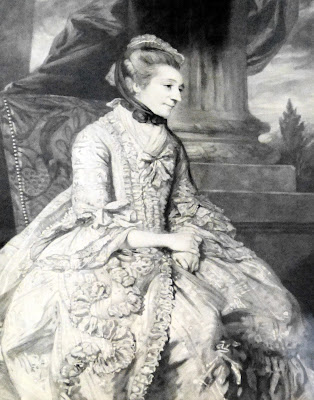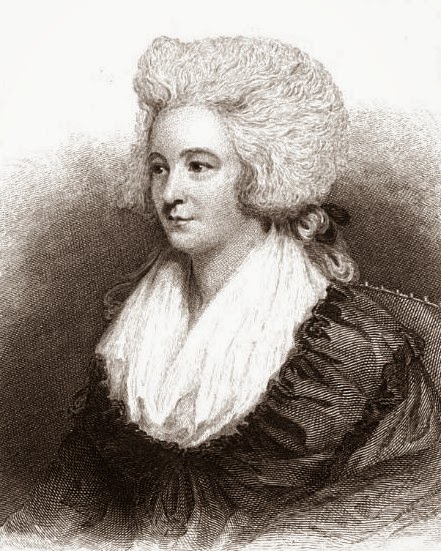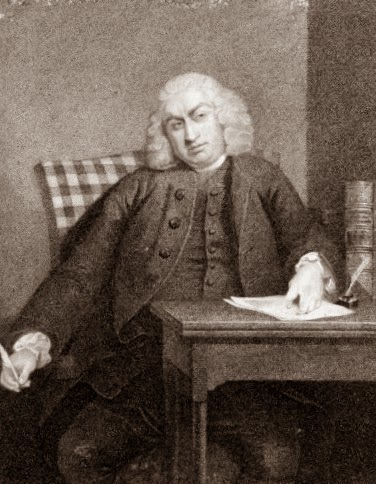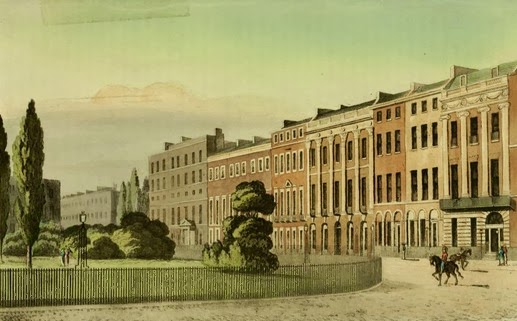 |
| Elizabeth Montagu from a print on display in Dr Johnson's House Museum |
Mrs Montagu is one of the Georgians I researched when writing A Perfect Match. She makes an appearance in my novel as an old friend of Alicia Westlake's father and it is while visiting her house in Portman Square that Alicia first comes face to face with the intriguing Mr Merry.
Profile
Elizabeth Montagu (2 October 1718 - 25 August 1800) was a bluestocking hostess and the author of An Essay on the Writings and Genius of Shakespeare (1769).
Family background
Elizabeth Robinson was born in York on 2 October 1718, the daughter of Matthew Robinson and his wife Elizabeth Drake. Both families were wealthy and well-connected, and the family estate included land in Yorkshire and Cambridge and later Kent.1
 |
| Mount Morris, Monks Horton, Kent, main residence of Elizabeth's family from the 1730s |
Elizabeth had seven brothers and one sister, Sarah, with whom she was very close. The girls were taught Latin, French and Italian as well as classical and English literature and history.
Cambridge
Elizabeth often stayed with her maternal grandmother and her second husband, Dr Conyers Middleton, who was a respected Cambridge academic. Elizabeth developed an appreciation for lively intellectual conversation both with her parents and in the Middleton household.
Her nephew wrote:
Her uncommon sensibility and acuteness of understanding, as well as her extraordinary beauty as a child, rendered her an object of great notice in the University.2
Whilst in Cambridge, Elizabeth became friends with Lady Margaret Harley, daughter of the Earl of Oxford, who married William Bentinck, 2nd Duke of Portland in 1734. Lady Margaret’s mother gave her the nickname Fidget. She visited the Duchess of Portland in London and widened her network of acquaintances to include Mary Pendarves, the poet Edward Young and Gilbert West.3
 |
| Elizabeth Montagu from The Letters of Mrs Elizabeth Montagu (1810) |
On 5 August 1742, Elizabeth married Edward Montagu, a man nearly thirty years her senior. He was a grandson of the 1st Earl of Sandwich and MP for Huntingdon and owned coalmines and estates in Northumberland, Yorkshire and Berkshire.
They had one son, John, whom they called Punch, who was born on 11 May 1743 in London. Elizabeth was devastated when he died suddenly in September 1744 and from this time onwards, she became increasingly religious.
After 1750, Elizabeth and Edward lived in London in Hill Street, Mayfair, but visited Sandleford Priory, their Berkshire estate near Newbury, in the spring and summer. The couple remained on friendly terms, but often spent time apart. Edward often visited his estates in the north alone whilst at various times, Elizabeth visited Bath, Tunbridge Wells, Paris, the Rhineland, the Low Countries and the Scottish highlands.
Literary hostess
Elizabeth became one of the three leading literary or bluestocking hostesses, together with Elizabeth Vesey and Frances Boscawen.
She started by inviting people to literary breakfasts and by 1760, she was hosting large evening assemblies where intellectual conversation and not cards was the central attraction. According to Fanny Burney, the chairs were arranged in a semi-circle in order to facilitate discussion.4
 |
| Fanny Burney from Diary and letters of Madame D'Arblay (1846) |
An introduction to Mrs Montagu’s was seen as a way to securing patronage. Her visitors included Dr Samuel Johnson, Sir Joshua Reynolds, Edmund Burke, David and Eva Garrick, Horace Walpole, William Pulteney, 1st Earl of Bath, Elizabeth Carter, Hester Thrale, Mary Delany, James Boswell, George Lyttelton, James Beattie, Hannah More, Fanny Burney, Anna Laetitia Barbauld, Sarah Fielding, Hester Chapone, and Anna Williams.3
 |
| Elizabeth Montagu's protegée, Hannah More, from Memoirs of the life and correspondence of Mrs Hannah More by William Roberts (1835) |
Hester Thrale described Elizabeth as “the first woman for literary knowledge in England, and if in England, I hope I may say in the world”.5
But although hailed as a great writer, Elizabeth had very little published. Apart from her contributions to Lyttelton’s Dialogues of the Dead (1760), her only published work was her critical An Essay on the Writings and Genius of Shakespeare (1769), supporting the English playwright’s work against Voltaire’s criticisms. It was very well received, but it included criticism of Samuel Johnson’s work and damaged her relationship with him.
“The wittiest woman in this Country”
Elizabeth was a brilliant conversationalist. Hannah More described her as having
“a large and manly as well as a gay and brilliant mind, much veracity, kindness and great fidelity in friendship.”6 She also declared that Elizabeth was “without exception the wittiest woman in this Country” whilst Samuel Johnson is said to have nicknamed her “Queen of the Blues”.7
 |
| Samuel Johnson, from The Life of Samuel Johnson by James Boswell (1791) |
Elizabeth was painted as one of the nine women depicted as muses in Portraits in the Characters of the Muses in the Temple of Apollo by Richard Samuel (1778).
Appearance
Fanny Burney described her as
...middle-sized, very thin, and looks infirm; she has a sensible and penetrating countenance, and the air and manner of a woman accustomed to being distinguished, and of great parts.8
Her nephew said:
A domineering womanShe was of the middle stature, and stooped a little, which gave an air of modesty to her countenance.2
Elizabeth was a forceful character and this often came out in her letters, as did her strong opinions. She believed in the independence of women and that marriage was a matter of wealth and connections. She was interested in politics and was fiercely loyal to the crown.
Her sister, Sarah, lived as her companion for some years before getting married. It has been suggested that it was a wish to be free of her sister’s overbearing behaviour that pushed Sarah into her brief, unhappy marriage.
Elizabeth was apt to fall out with people who did not agree with her. In 1772, Dorothea Gregory, a doctor’s daughter from Edinburgh, became Elizabeth’s ward. Elizabeth treated her like a daughter and intended her for her nephew, but when Dorothea fell in love with and agreed to marry a penniless suitor, Elizabeth was furious and cast her off.
Widowhood
On 12 May 1775, Edward Montagu died, leaving Elizabeth almost his entire estate – an income of around £7,000 per annum. She successfully managed her business affairs and was generous with her money.
She granted annuities to indigent writers and patronised promising new talent, such as Hannah More’s Bristol milkmaid turned poet, Ann Yearsley. Sadly, this attempt at benevolence ended badly; their desire to manage the poet’s income led to a scandalous break with her patrons.
Portman Square
 |
| Portman Square, from Ackermann's Repository of Arts (Aug 1813) |
In 1777, Elizabeth commissioned James Stuart to build Montagu House in Portman Square. She was finally able to move in in late 1781 and continue her literary assemblies here. She had a special room made to display her feather work – a huge tapestry made entirely from feathers which Queen Charlotte visited Montagu House to see.
 |
| Montagu House, 22 Portman Square, from The Private Palaces of London past and present by EB Chancellor (1908) |
Elizabeth gave an annual entertainment in Portman Square for London climbing boys.
Death
Elizabeth Montagu died on 25 August 1800. She left her entire estate to her nephew, Matthew Robinson Montagu, later Baron Rokeby.
Rachel Knowles writes clean/Christian Regency era romance and historical non-fiction. She has been sharing her research on this blog since 2011. Rachel lives in the beautiful Georgian seaside town of Weymouth, Dorset, on the south coast of England, with her husband, Andrew.
Find out more about Rachel's books and sign up for her newsletter here.If you have enjoyed this blog and want to encourage me and help me to keep making my research freely available, please buy me a virtual cup of coffee by clicking the button below.
Notes
(1) Some sources give her date of birth as 2 October 1720.
(2) From The Letters of Mrs Elizabeth Montagu, published by Matthew Montagu (1810).
(3) Mary Pendarves (neé Granville) became Mary Delany on her second marriage in 1743.
(4) From Burney memoirs as quoted in Hannah More, The First Victorian by Anne Stott (2003).
(5) From Diary and letters of Madame D'Arblay, volume 1, 23 Aug 1778.
(6) From a letter by Hannah More 2 Sept 1800 quoted in Hannah More, The First Victorian by Anne Stott (2003).
(7) From a letter by Hannah More 1 Sept 1800 quoted in Hannah More, The First Victorian by Anne Stott (2003).
(8) From Diary and letters of Madame D'Arblay, volume 1.
Sources used include:
Burney, Fanny, Diary and letters of Madame D'Arblay, edited by her niece, Charlotte Barrett (Henry Colburn, 1846, London)
Chancellor, E Beresford, The Private Palaces of London past and present (1908)
Eger, Elizabeth, Bluestocking circle (c1755-c1795), Oxford Dictionary of National Biography (Oxford University Press, online edn Jan 2012, accessed 7 June 2012)
Montagu, Elizabeth, ed Climenson, Emily, Elizabeth Montagu, The Queen of the Bluestockings, her correspondence from 1720-1761 (1906)
Montagu, Elizabeth, The Letters of Mrs Elizabeth Montagu, pub Matthew Montagu (1810)
Schnorrenberg, Barbara Brandon, Montagu, Elizabeth (1718-1800) Oxford Dictionary of National Biography (Oxford University Press, 2004, online edn May 2009, accessed 7 June 2012)
Stott, Anne, Hannah More, The First Victorian (2003)
(1) Some sources give her date of birth as 2 October 1720.
(2) From The Letters of Mrs Elizabeth Montagu, published by Matthew Montagu (1810).
(3) Mary Pendarves (neé Granville) became Mary Delany on her second marriage in 1743.
(4) From Burney memoirs as quoted in Hannah More, The First Victorian by Anne Stott (2003).
(5) From Diary and letters of Madame D'Arblay, volume 1, 23 Aug 1778.
(6) From a letter by Hannah More 2 Sept 1800 quoted in Hannah More, The First Victorian by Anne Stott (2003).
(7) From a letter by Hannah More 1 Sept 1800 quoted in Hannah More, The First Victorian by Anne Stott (2003).
(8) From Diary and letters of Madame D'Arblay, volume 1.
Sources used include:
Burney, Fanny, Diary and letters of Madame D'Arblay, edited by her niece, Charlotte Barrett (Henry Colburn, 1846, London)
Chancellor, E Beresford, The Private Palaces of London past and present (1908)
Eger, Elizabeth, Bluestocking circle (c1755-c1795), Oxford Dictionary of National Biography (Oxford University Press, online edn Jan 2012, accessed 7 June 2012)
Montagu, Elizabeth, ed Climenson, Emily, Elizabeth Montagu, The Queen of the Bluestockings, her correspondence from 1720-1761 (1906)
Montagu, Elizabeth, The Letters of Mrs Elizabeth Montagu, pub Matthew Montagu (1810)
Schnorrenberg, Barbara Brandon, Montagu, Elizabeth (1718-1800) Oxford Dictionary of National Biography (Oxford University Press, 2004, online edn May 2009, accessed 7 June 2012)
Stott, Anne, Hannah More, The First Victorian (2003)


I'm sure Miss Bingley would have declared This Elizabeth a very accomplished woman. When reading excellent posts such as this one realizes that in England at least, women, especially talented women, were not mere chattels of obnoxious men and that they were appreciated.
ReplyDeleteThank you once more for an excellent post.
Thanks very much, Brian. I agree with you that Mrs Montagu must have met Miss Bingley's requirements and I'm sure even Mr Darcy would have agreed that she was a very accomplished woman.
DeleteAN extremely interesting lady-but was she and Hester Thrale friends,or social rivals?
ReplyDeleteAn interesting question. I have read that they were rivals, but some of the comments made by her as reported in Fanny Burney's diary are extremely complimentary, certainly suggesting admiration, if not friendship, so maybe a bit of both.
DeleteI am interested in finding out who attended the "salon" events that Elizabeth Montague held at Denton Hall in Newcastle. Do her surviving letters give an account of who attended her "salon" events on the occasions she spent her summers in the North of England?
ReplyDeleteThe letters of Elizabeth Montagu that I referred to when researching this post are freely available on Internet archive. This is a link to the search on that website that you might find helpful: https://archive.org/search.php?query=Elizabeth%20Montagu.
Delete"She believed in the independence of women and that marriage was a matter of wealth and connections."
ReplyDeleteHey is there a source you got this statement from? Because I'm doing a research paper and would like to know where you got it from.
Thanks
These sentiments are expressed in the Oxford Dictionary of National Biography article referenced above and are borne out in Elizabeth Montagu's letters.
Delete